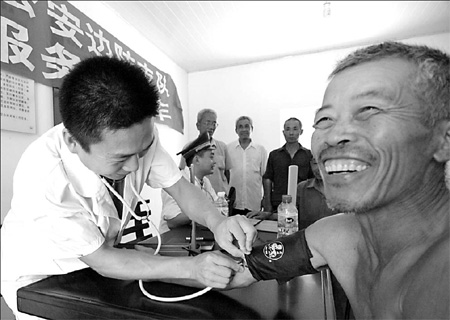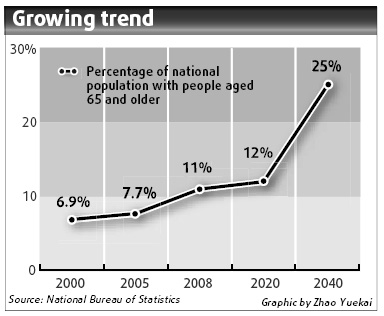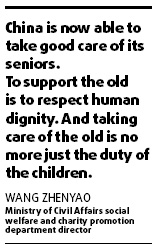Society
Aging seniors facing life without proper care
By Shan Juan (China Daily)
Updated: 2009-12-30 07:51
 |
Large Medium Small |
More children leaving 'empty nests' for parents to cope alone
Li Xiuqin, 56, has been exercising every morning since her retirement.
She does it not only for fun but to stay healthy. The retired school teacher lives with her husband, also retired, in Xianyang of Shaanxi province.
 A People's Liberation Army medical worker measures the blood pressure of a senior in Taizhou of Zhejiang province in this file photo. [Zhu Xiaoqin] |
Their only daughter, born around 1980 when the family planning policy went into effect, however, works in Shanghai, the country's business hub.
Still struggling with high living expenses in the city, particularly for housing, her daughter cannot afford to have her parents live with her in Shanghai.
As the first generation of parents affected by the one-child policy reach their 60s, they face great challenges in senior care, particularly for so-called "empty nest" parents like Li and her husband.
Official statistics show nearly 80 million seniors aged 60 and over in China now live in empty nests with no children by their sides to take care of them.
Despite a well-off life in her hometown, Li said she misses her daughter, who comes back to visit twice a year.
Worse, the difficulties of aging, like medical care and poorer health, loom as "my husband and I become older and older", Li said.
"Maybe life today is easier and richer than my parents' time but I don't think I will be as lucky as them, who always had children around taking care of them," she said.
The tradition that grown-up children take care of aged parents in big families with multiple children is vanishing today, particularly in cities where a couple is limited to one child, experts said.
People older than 60 numbered 169 million in China at the end of 2008, accounting for 13 percent of the population, much higher than the United Nations' threshold of 10 percent for an aging society.

Among them nearly half, 49.8 percent, live in empty nests.
In rural areas, some, in spite of their age, even have to take care of grandchildren as their children often leave for cities seeking better employment.
However, about a quarter of the seniors, about 30 million, will become disabled due to disease or age and need long-term care, Yan Qingchun, deputy director of the China National Committee on Aging (CNCA) office, said at the Second China Summit Forum on Aging and Services last week.
"For them, living in a professional nursing home might be the best choice," he said.
However, China now has about 40,000 such facilities with nearly 2.4 million beds, official statistics showed.
A latest survey conducted by CNCA showed only 10 percent of urban seniors are willing to live in a nursing home.
"Surely I'd be happier living with my daughter," Li said.
However, she would have to overcome potential problems.
"It wouldn't be easy for me to adapt to a new environment in Shanghai," she said.
"And my medical insurance works only in my hometown."
Nursing home woes
With a monthly pension of 2,200 yuan ($322), Li, if she wants, can afford to live in a mediocre nursing home in her city.
However, for a great number of seniors, especially those in rural areas, they are not able to afford such facilities, which cost at least 1,000 yuan a month in the country, Yan said.
Nursing homes, both government and privately owned, are business oriented and open to those who can afford to pay.
"They are providing quality services to the already well-off seniors while not helping the poor and needy," said Wang Zhenyao, director of the social welfare and charity promotion department in the Ministry of Civil Affairs.
"It's right to have them both," he said.
State-owned nursing homes, largely subsidized by the government, should be public goods and obliged to help the poor with basic care and support, Yan said.
In developed countries like the United States, 5 percent of seniors live in nursing homes.
Currently in China, with all beds in such facilities taken, it is just 1 percent.

A lack of effective management and supervision has also been noted in nursing homes in China, Yan said.
In April, a private nursing home in Changchun, capital of Jilin province, was found abusing their residents, reports said.
Investigations showed the nursing home was not registered with the government.
In fact, due to legal loopholes, two-thirds of the nation's nursing homes are operating without registration, Yan said.
"Without registration there is no supervision at all," he said.
Even registered ones are usually short staffed and in great need of professional workers who can provide help for disabled seniors, he said.
By the end of 2008, the country had 30,000 of such certified workers, while at least 10 million of them are reportedly needed.
Way out
As China faces an aging society, the government should work out a feasible social welfare and care system to benefit everyone in the nation and help improve social harmony and mend social conflicts, urged Wang.
"With high-speed economic growth for three decades, China is now able to take good care of its seniors," he said.
"To support the old is to respect human dignity. And taking care of the old is no more just the duty of the children," he said.
Besides, as the "421 Family", consisting of four grandparents, two parents and an only child, becomes the new mainstream family in China, the maintenance burden borne by only children will become heavier, experts predict.
"That will put pressure on the unsound social welfare system of China," Wang said.
In response, the government has kept expanding pension coverage in the country, where quite a few people have no pension at all.
The Ningxia Hui autonomous region in December began giving a basic monthly living allowance to local residents older than 60 who had no pension and faced financial difficulties, reports said.
Wang also urged the central government to speed up building a community-based care system to make sure 90 percent of seniors receive care at home, 6 percent are looked after in their communities, with the remaining 4 percent live in seniors homes.
However, he conceded that current community planning in China does not give much thought to older residents.
"We should start building our seniors a 'Noah's Ark' within the communities," he said.







